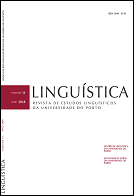On the homogeneous nature of ‘Pretérito Perfeito Composto’ in European
Abstract
In European Portuguese, ‘Pretérito Perfeito Composto’ (PPC) is a tense that presents some peculiarities distinguishing it clearly from similar constructions in other languages. Although this construction exhibits a single-eventuality reading in other languages, in EP there is typically a multiple eventuality reading. So, in the first part of this paper, we discuss the quantification over situations underlying the PPC in EP considering the notions of frequency, habituality and iteration. We argue that iteration is the relevant concept, as PPC converts an undetermined number of basic events of the same type into a single event. However, in some cases, the PPC in EP has a second reading available: a single-eventuality, like in other languages. Therefore, in the second part of this paper, we present an aspectual analysis of the PPC that includes both the single-event reading and the iterative reading, in order to provide a unified explanation for both readings. To do so, we will resort to the notion of homogeneity as defined in Landman & Rothstein 2012a e 2012b). We will argue that homogeneity is a central aspectual property of PPC in EP and that the distinction between segmental homogeneity and incremental homogeneity proposed by these authors for ‘for x time’ adverbials allows us to explain both readings of this EP tense.
References
Cunha, L.F. 2006. Frequência vs. Habitualidade: Distinções e Convergências. In: Actas del XXXV Simposio Internacional de la Sociedad Española de Lingüistica, 333-357. Retirado da Internet, a 25 de maio de 2012: http:// www3.unileon.es/ dp/dfh/SEL/actas/Cunha.pdf.
Ilari, R. 2001. Notas sobre o Passado Composto em Português. Letras, Curitiba, 55: 129-152.
Kratzer, A. 1989. An Investigation of the Lumps of Though. Linguistics and Philosophy, 12, nº5: 607-653.
Laca, B. 2006. Indefinites, quantifiers and pluractionals. What scope effects tell us about event pluralities. In: S. Vogeleer; L. Tasmowski (Eds.). Non- definiteness and plurality. Amsterdam/Philadelphia: John Benjamins Publishing Company, 191-217.
Laca, B. 2010. Perfect Semantics: How Universal Are Ibero-Amerian Present Perfects?. In: C. Borgonovo et al. (Eds.). Selected Proceedings of the 12th Hispanic Linguistics Symposium. Somerville, MA: Cascadilla Proceedings Project, 1-16. Retirado, a 25 de maio de 2012, da Internet: http://www.lingref.com/cpp/hls/12/paper2401.pdf.
Landman, F.& Rothstein, S. 2012a. The felicity of aspectual for-phrases, part 1: homogeneity. Language and Linguistic Compass. Oxford: Blackwell- Wiley, 85-96.
Landman, F.& Rothstein, S. 2012b. The felicity of aspectual for-phrases, part 2: incremental homogeneity. Language and Linguistic Compass. Oxford: Blackwell-Wiley, 97-112.
Link, G. 1983. The logical analysis of plurals and mass terms: a lattice- theoretical approach. In: R. Bäuerle; C. Schwarze; A. von Stechow (Eds.). Meaning, use and interpretation of language. Berlin: Walter de Gruyter, 302-323.
Lopes, O. 1986/2005. Sobre as noções de definido e de presente de enunciação. Entre a Palavra e o Discurso. Estudos de Lingüística (1977- 1993). Edição coordenada por F. Oliveira e A. M. Brito. Porto: Campo das Letras, 105-120.
Martinez-Atienza, M. 2008. Dos formas de oposición en el ámbito románico. In: Carrasco Gutiérrez, A. Tiempos compuestos y formas verbales complejas. Madrid: Lingüística Iberoamericana, 204 -229.
Oliveira, F. 2003. Tempo e Aspeto. In: Mateus, M. H. et al., Gramática da Língua Portuguesa. Lisboa: Caminho, 127-178.
Oliveira, F.& Leal, A. 2012. “Sobre a iteração do Pretérito Perfeito Composto em Português Europeu”. In. Linguística - Revista de Estudos Linguísticos da UP, vol.7, nº1: 65-88.
Oliveira, F., Leal, A. & Silva, F. 2014. Pretérito Perfeito Composto e quantificação em Português Europeu. Textos Selecionados do XXIX Encontro Nacional da Associação Portuguesa de Linguística, 407-418.
Smith, C. 1991. The Parameter of Aspect. Dordrecht: Reidel Pub. Comp.
Squartini, M. & Bertinetto, P.M. 2000. The Simple and Compound Past in Romance Languages. In: Ö. Dahl (Ed.). Tense and Aspect in the Languages of Europe. Berlim: Mouton de Gruyter, 403-440.
Van Geenhoven, V. 2004. For-adverbials, frequentative aspect, and pluractionality. Natural Language Semantics, 12, nº2: 135-190.
CETEMPúblico (Corpus de Extractos de Textos Electrónicos MCT/Público) - http://www.linguateca.pt/
Downloads
Published
Issue
Section
License
Copyright (c) 2019 Linguística: Revista de Estudos Linguísticos da Universidade do Porto

This work is licensed under a Creative Commons Attribution-NonCommercial 4.0 International License.



